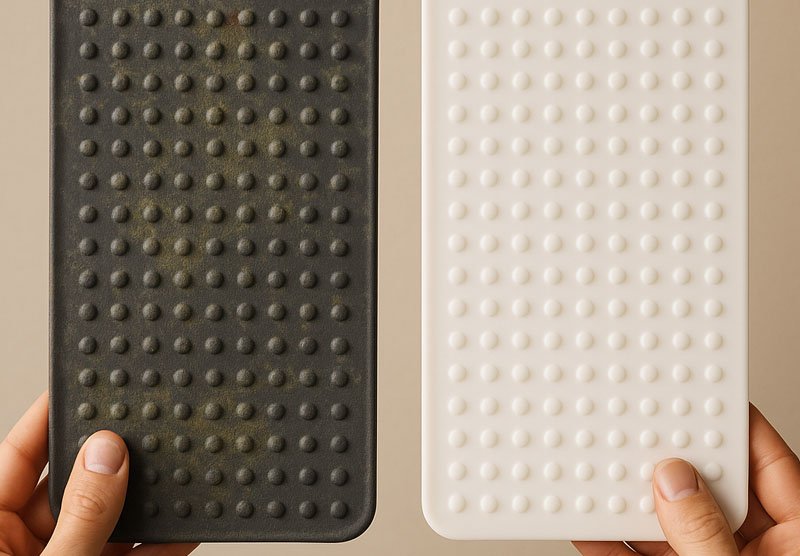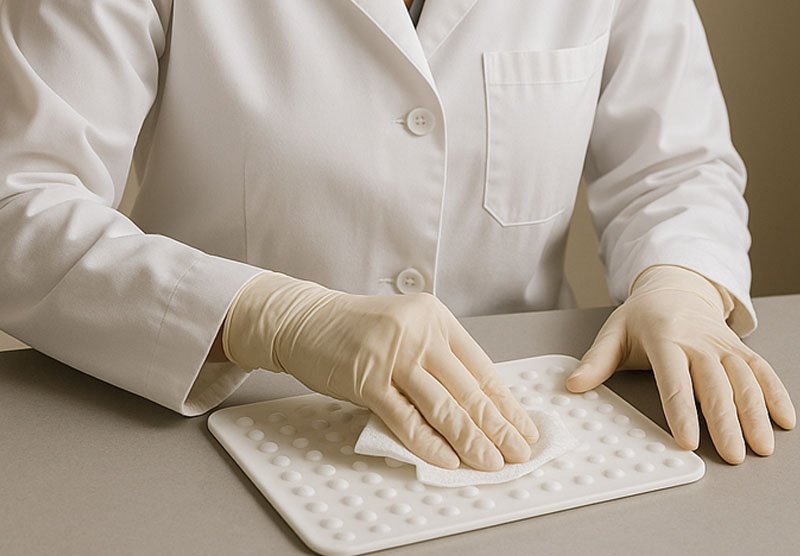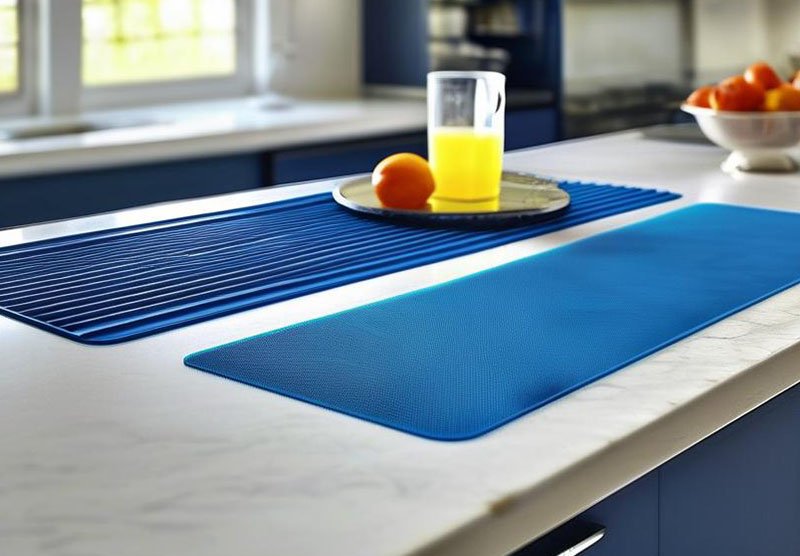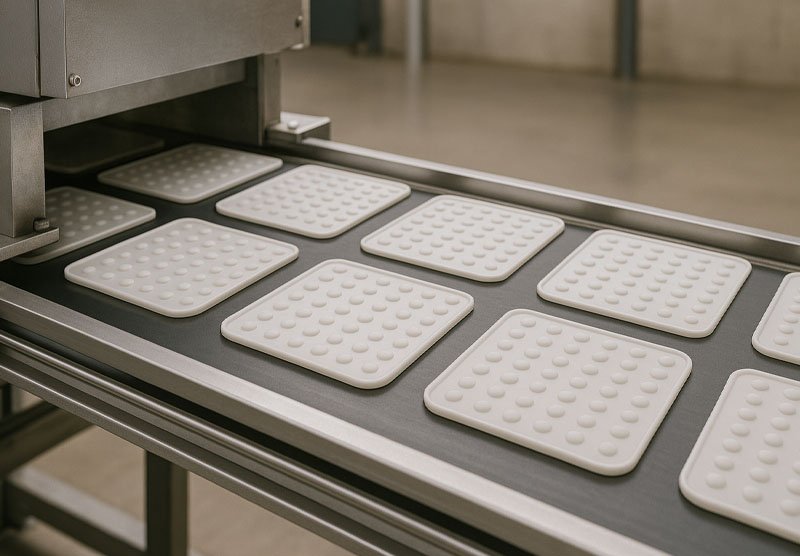Mold. Mildew. Microbes. They thrive on damp surfaces, silently contaminating your workspace and damaging your brand reputation. In industries where cleanliness isn’t optional—it’s mandatory—these invisible intruders can ruin everything.
Mold-resistant silicone mats are engineered to prevent microbial growth, resist moisture absorption, and maintain hygienic surfaces in demanding environments. Whether you run a bakery, hospital, lab, or baby product facility, these mats help protect both your equipment and your end-users.
Let’s take a closer look at how silicone fights mold, supports hygiene, and why your next mat should come from Ruiyang.
Why Do Traditional Mats Harbor Mold and Bacteria?
Rubber, PVC, foam, or textile mats absorb moisture. Once wet, they become perfect breeding grounds for mold, mildew, and bacteria. The result?
- Odors
- Discoloration
- Health hazards
- Failed inspections
It’s not just a visual issue—it’s a compliance and safety problem. Mold spores spread fast and can be hard to detect until it’s too late.
How Is Silicone Naturally Mold-Resistant?
Silicone has two key advantages that make it an enemy of mold:
- Non-porous Structure: It doesn’t absorb water, oil, or organic matter, cutting off food sources for microbes.
- Inert Material: Silicone doesn’t degrade or release nutrients that fungi or bacteria feed on.
We also offer antimicrobial silicone infused with agents like silver ions or zinc oxide to suppress bacterial growth proactively.

Ideal Applications for Mold-Resistant & Hygienic Mats
These mats are especially critical in sectors where hygiene is non-negotiable:
- Food Preparation & Commercial Kitchens: Prevent bacterial cross-contamination and pass every health inspection.
- Medical Facilities & Labs: Keep benches, carts, and trays sterile and compliant.
- Baby Product Manufacturing: Protect sensitive items during production and packaging.
- Cleanrooms & Electronics: Maintain dust-free, contamination-controlled work areas.
If your customer is operating under FDA, ISO 13485, or HACCP regulations, mold-resistant silicone mats aren’t just helpful—they’re essential.
What Makes Ruiyang Silicone Mats Hygienic?
Here’s why our silicone mats are trusted by B2B buyers in hygiene-critical industries:
- Easy to Sterilize: Withstands boiling, autoclaving, dishwashing, or alcohol wiping without deforming.
- Zero Absorption: Won’t trap food, fluids, or chemicals—even after years of use.
- Smooth or Sealed Edges: Prevents microbial buildup in corners or seams.
- Antimicrobial Options: Additives available on request for enhanced resistance in ultra-clean environments.

Cleaning & Maintenance: How Simple Is It?
Compared to traditional mats, silicone makes cleaning almost effortless:
- Daily Cleaning: Wipe with mild soap and water or sanitize with alcohol.
- Deep Cleaning: Safe for dishwashers or hot-water sterilization up to 230°C.
- Stain Resistant: Even food dyes, oils, and solvents are easily removed.
Reusable, durable, and easy to disinfect—these mats reduce both cleaning time and replacement costs.
Customization Options for Hygienic Environments
We understand different industries have different hygiene requirements. That’s why we offer fully customizable solutions:
- Sizes & Shapes: From small tray liners to full-surface lab bench covers.
- Thickness Options: Thicker mats for extra cushioning or thinner ones for portability.
- Colors: Light tones for cleanliness visibility (white, grey, blue), or color-coded for different zones.
- Logo & Markings: Discreet branding or functional markings like measurement grids or safety zones.

The Manufacturing Process for Hygienic Silicone Mats
Our production methods ensure every mat meets strict hygiene and durability standards:
- Material Selection:
- Food-grade or medical-grade platinum silicone
- Optional antimicrobial additive integration
- Molding Process:
- Injection or compression molding for tight, clean edges and smooth surfaces
- Curing & Finishing:
- High-temp curing locks in durability and non-stick properties
- Polished or matte surface finishes based on client need
- Sterilization Readiness Testing:
- Confirm resistance to autoclave, alcohol, bleach, and high-temp environments
- Final Inspection & Packing:
- Clean-room style packaging available for medical or sensitive environments

Safety Standards and Certifications You Can Trust
When health is on the line, certifications matter. We deliver on every front:
- FDA & LFGB Approved: For food contact safety
- ISO 9001 Certified: Strict quality management
- ISO 13485 Available: Upon request for medical-grade applications
- REACH & RoHS Compliance: Toxin-free, eco-conscious production
- Antimicrobial Efficacy Reports: Third-party test results available for antimicrobial materials
We back our claims with real, verifiable documents—not Photoshop fakes.
FAQs About Mold-Resistant Silicone Mats
Q: Will silicone mats resist black mold over time?
A: Yes—silicone is non-absorbent and naturally mold-resistant. No food, no moisture = no mold.
Q: Can I sterilize these mats in an autoclave?
A: Absolutely. They withstand temperatures up to 230°C without warping or degrading.
Q: Are antimicrobial mats food-safe?
A: Yes. We only use FDA-approved additives that are safe for food contact.
Q: What’s the MOQ for hygienic silicone mats?
A: 500 pcs is standard, but we offer flexibility for niche medical or food applications.
Q: Do you offer anti-static and mold-resistant combo mats?
A: Yes. Custom formulations can be combined depending on your industry’s needs.
Conclusion
Mold-resistant, hygienic silicone mats are the gold standard in safety and cleanliness. Whether in a sterile lab, a bustling kitchen, or a baby product assembly line, these mats protect your work surfaces and your reputation.
At Ruiyang Silicone, we combine advanced material science, precision manufacturing, and full customization to deliver mats you can trust—day in, day out.
Let’s design your next hygienic silicone solution together—because when it comes to health and safety, there’s no room for compromise.